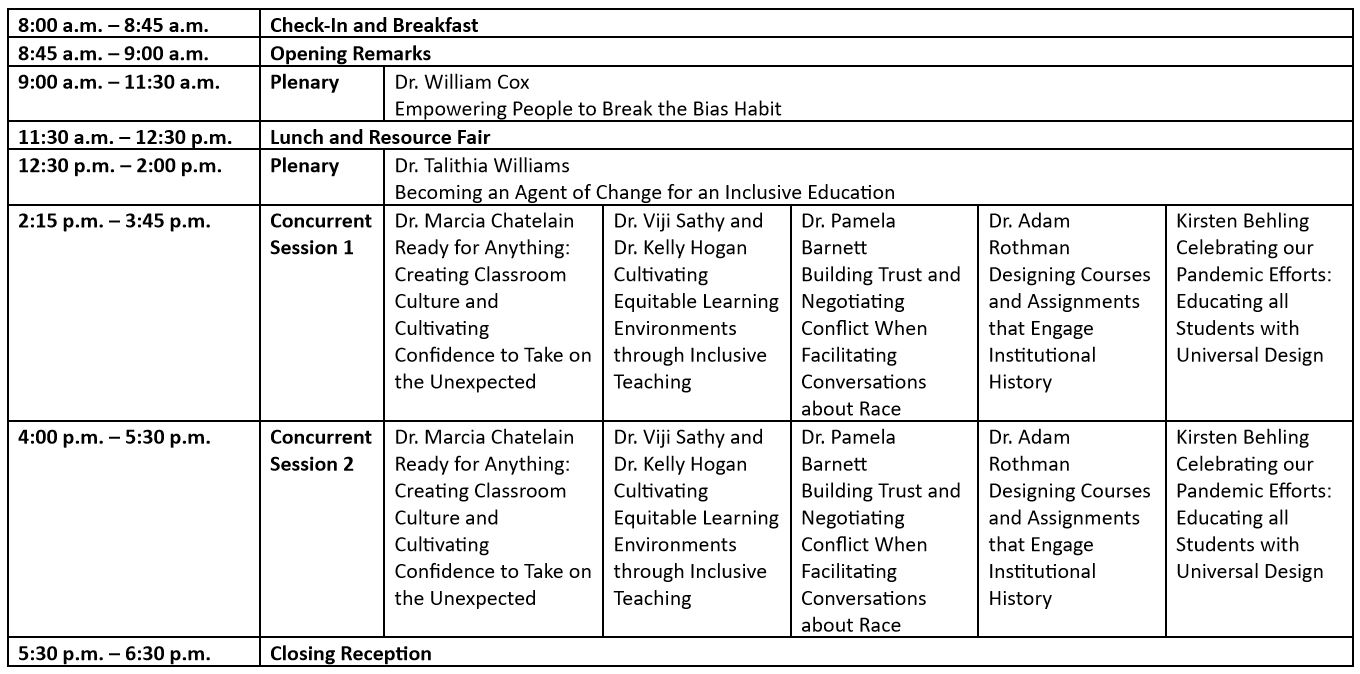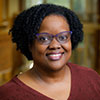Wake Forest University’s Inclusive Teaching Conference (Thursday, April 21, 2022)

This blog post is a collaborative “I learned _____.” from a subset of Research and Instruction Librarians who attended the conference. I will say this . . . the librarians were in the proverbial house!!!! Joy set the cornerstone by sitting in the second row on the right-hand side and we clustered around her. Dean Tim sat to my left. Morgan was on my right. Hu scooted in when he arrived. I heard Roz’s voice and saw Amanda, Kathy, Kaeley, and Summer at lunch. Joy and I hung out together the entire day as our schedules were the same between the times I jetted out to check on Dr. Talithia Williams as one of her hosts. My hats off to all my fellow committee members and all of the volunteers the day of the event. My true appreciation and gratitude goes out to CAT for all of their hard work viewing numerous videos to select evidence-based speakers as well as their pre-planning sessions and to the administration at Wake for collectively canceling classes for faculty and staff to come together to learn more about inclusive teaching practices that will shape our mindsets, practices, and pedagogy.
Amanda’s Takeaways: My favorite session was Marcia Chatelain’s “Ready for Anything: Creating Classroom Culture and Cultivating Confidence to Take on the Unexpected.” It was a real treat, as Chatelain has recently won the Pulitzer Prize in history for her book on The Golden Arches in Black America. Chatelain focused on developing practical strategies for creating positive and inclusive classroom culture, including letting students pursue their own curiosities – something that is thankfully easy to do in most of our LIB courses. I also appreciated her point emphasizing the need to work on our institutions – for can we be expected to model inclusivity in our classrooms when our institutions don’t reflect that equity (specifically mentioning how women and people of color do a disproportionate share of student-oriented and service-related work). Overall, it was an excellent session and I was so impressed with CAT’s ability to pull in such great speakers. They really put on a wonderful conference.
Morgan’s Takeaways: There was so much richness in this one-day conference – so much so I’m still digesting and synthesizing all that goodness and how it will go on to impact my own pedagogical practices. A few immediate takeaways came from Dr. William Cox’s plenary, “Empowering People to Break the Bias Habit”. As a Librarian, we think a lot about bias and its impact on how information is produced, consumed, and shared. I’m a part of a team of RIS colleagues who are working to create a LIS course exploring Critical Information Literacy (set to launch Fall ‘22!) and I found so much of Dr. Cox’s work and conversation incredibly relevant to the work we are aiming to do in this course. One obstacle we have come up against when designing the course is how do we leave room for hope in these larger conversations with students about the insidious nature of bias and mis/disinformation? I found Dr. Cox’s presentation and discussion of bias to be incredibly hopeful (“If you can name, you can tame it”) with not only a number of framing conversations that will be helpful for discussing bias (and mis/disinformation) in the classroom- understanding how we change habits, awareness of why bias happens and persists – but also actionable tools and strategies we can introduce to students ( “Detect, Reflect, Reject”, “Broaden your Input”, and “Seek individuating information” among many others) to help them recognize, reflect and challenge/react to bias in their own lives. Also want to shout out biashabit.com which includes so much great information and additional resources for learning, reflecting, and becoming actionable/accountable when dealing with bias. Major kudos to CAT and the conference planning team for such an invigorating, useful, and timely (even though it took four years to happen!) conference.
Joy’s Takeaways: The Inclusive Teaching Conference was one of the most inspiring conferences I have ever attended. Every aspect of the day was perfectly executed–the speakers were outstanding, the food was delicious, and the hospitality was unsurpassed. It was a day set aside to focus on one of the most important and challenging aspects of teaching in higher education. All four of the sessions I attended were informative and inspiring. One of the rock stars of the day was Talithia Williams who teaches in the Department of Mathematics at Harvey Mudd College. Her plenary session was titled, “Becoming an Agent of Change for Inclusive Education.” Dr. Williams is known for her Tedx Talk Own Your Body’s Data and also her role as co-host of the PBS show Nova Wonders. You can read more about her here. She talked about how her institution used data to see that they were losing potential math majors after students took a particular computer science class. Her department revamped the course and allowed students to self-select into four different “levels” of the same course that ranged from “new to the topic” to “advanced.” They used the same textbook in all of the sections but taught it differently. At the end of the course, they encouraged all of the students to take the next level computer science course. She then shared how they revamped their interview process to recruit a more diverse faculty. They did this by setting up a rubric that included commitment to diversity as a metric for assessing each candidate. As a result, Harvey Mudd currently has 4 tenured black professors, and 3 of those are in the math department. It was an inspiring and informative presentation. It was a privilege to attend this conference. Thank you, Center for the Advancement of Teaching!
Hu’s Takeaways: I was only able to attend the afternoon sessions, but like Joy, I found this to be one of the most inspiring conferences I’ve ever attended, and like Amanda, I found Marcia Chatelain’s “Ready for Anything: Creating Classroom Culture and Cultivating Confidence to Take on the Unexpected.” both enlightening and engaging. I was so energized by this experience. Each presentation focused on challenging issues around diversity and inclusion and offered concrete, tangible action items for change. I came away with so many new tools in my toolkit and reinvigorated by these presentations and the great conversations that ensued from these presentations. I am so grateful to the Center for the Advancement of Teaching for making this experience possible!
Denice’s Takeaways: Reflecting on serving on the Inclusive Conference Planning Committee during its first launch attempt back in Fall 2019 – Spring 2020 to rejoining the committee in Fall of 2021 when planning resumed, the conference exceeded my expectations as an individual working behind the scenes as well as participant going to both plenary sessions in the morning and both concurrent session in the afternoon. I still haven’t had the opportunity to self-reflect even after attending a focus session after the conference. It was heartening to reaffirm certain practices I implemented in my class this past semester as well as learn about additional techniques that I can add, perspectives to include, and workflow considerations to implement. Mind you I took copious notes and took pictures of most of the slides for every session I attended until the battery died on my iPad and I had to switch to my iPhone (I missed a couple of slides in the transition.). Every single session I attended was illuminating. Thus, I’ll touch on Dr. Viji Sathy’s (Twitter: @vijisathay) and Dr. Kelly Hogan’s (Twitter: @DrMrsKellyHogan) concurrent session “Cultivating Equitable Learning Environments through Inclusive Teaching.” They have taught over 100 webinars, sessions, and classes on creating equitable learning environments through inclusive teaching and it shows when you Google their names along with keywords from the title. I love how they implemented active learning throughout the session and demonstrated what they were teaching while providing the context e.g. the why. For example, one tip was to include the written instructions on the slide or in a visual for the students to refer to versus only verbally communicating instructions. For every activity during the session, the instructions were included on the respective slide. My favorite line was “An Inclusive Classroom means . .. the instructor and students move away from assumptions that some students are lacking and move toward the idea that learning environments and course designs lacking structure are a problem.” I’m going to review my notes, make some tweaks, and set aside time over the summer to modify LIB290: Information Literacy for Engineering. I’m excited and looking forward to it. As Hu says, “Onward!”

4 Comments on ‘The Inclusive Teaching Conference (Thursday, April 21, 2022)’
Denise, thank you for this excellent and thoughtful summary! (and gathering all our takeaways into one post!) I’m still so in awe of all the amazing work the CAT and the planning committee did to make this incredible event happen! (and I really want us to keep talking about ideas/strategies from the “Cultivating Equitable Learning Environments through Inclusive Teaching!”)
What an amazing conference! Thank you for continuing the conversation by sharing these takeaways.
Thank you all for this recap. I can see this was an impactful conference! Kudos to the Center for the Advancement of Teaching and the planning committee!
Hu, we definitely need to look at setting time aside this summer to reflect, assess, and implement with our information literacy courses. I’m trying to figure out when to do that now. You are totally and always welcome Carrie and Mary Beth!